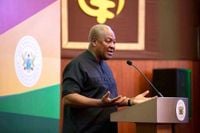A new legal battle is brewing in Accra, Ghana, as a prominent rights group challenges the government over its acceptance of deportees from the United States. On Monday, October 13, 2025, a group of 14 West African nationals arrived in Ghana—just the latest cohort sent under a controversial accord between the two countries. Their arrival brings the total number of deportees accepted by the Ghanaian government to 42, according to lawyer Oliver Barker-Vormawor, who represents migrants and leads the advocacy group Democracy Hub.
Just one day after the latest arrivals, Democracy Hub filed a lawsuit against the Ghanaian government. The group alleges that the agreement with Washington is unconstitutional because it was never approved by Ghana’s parliament. More troubling, they argue, is the claim that the deal may violate international conventions that forbid sending people to countries where they could face persecution.
Barker-Vormawor, who has become a vocal advocate for migrants’ rights in the region, told the Associated Press that the arrangement lacks transparency and accountability. He contends that “the agreement with Washington is unconstitutional because it wasn’t approved by the Ghanaian parliament and may violate conventions that forbid sending people to countries where they could face persecution.” This assertion forms the crux of Democracy Hub’s legal challenge, which now awaits a response from the government in court.
Government spokesman Felix Kwakye Ofosu offered a brief response to the lawsuit, stating that the attorney general would defend the arrangement in court. Beyond that, Ofosu declined to comment further, leaving many questions about the government’s rationale and the specifics of the agreement unanswered.
The roots of this controversy stretch back to July 2025, when the administration of U.S. President Donald Trump began a renewed crackdown on migrants who had entered the United States illegally. The Trump administration has repeatedly stated that its focus is on individuals with criminal records, particularly those who cannot easily be deported to their home countries. Yet, the details of the deportation program have remained largely secretive, with only fragments of information emerging through official statements and legal filings.
According to reporting by The Associated Press, the United States has struck similar agreements with at least five African nations—Ghana, Eswatini, South Sudan, Rwanda, and Uganda—under what is being called a “third-country deportation program.” Rights groups have strongly protested the program, labeling it opaque and warning that it sends deportees to countries where they may have no ties and little hope of due process. In some cases, critics argue, migrants have even been deported to third countries when their actual home countries would have accepted them.
Last month, the U.S. deported an initial group of 14 West African immigrants to Ghana. Ghanaian authorities later stated that all of these deportees had been sent on to their home countries elsewhere in West Africa, including Togo, Nigeria, and Mali. However, lawyers representing the migrants told the Associated Press in September that 11 of them were still being held at a military camp on the outskirts of Accra, Ghana’s capital. The lawyers described the conditions there as “terrible,” raising serious humanitarian concerns.
Since that revelation, the situation has grown even more complicated. Barker-Vormawor reported that 10 of those migrants have now been deported to Togo, even though only two are actually Togolese nationals. This detail has fueled additional criticism of the program, as it suggests that individuals are being sent to countries with which they have little or no connection—a practice that could run afoul of both Ghanaian law and international human rights conventions.
The United States’ use of third-country deportations is not limited to Ghana. In July 2025, the U.S. sent a first group of five deportees to Eswatini, stating that these individuals had been convicted of serious crimes, including murder and child rape. Since then, deportations have also been carried out to South Sudan and Rwanda. The agreement with Uganda remains in place, though no deportations there have been publicly announced. According to sources cited by The Gleaner, six deportees are still detained in an unspecified facility in South Sudan, while Rwandan authorities have not disclosed the location or status of seven deportees sent there.
Beyond the legal and political wrangling, the human stories at the heart of this issue remain deeply troubling. Rights groups argue that the lack of transparency in the U.S. program denies migrants the ability to contest their deportations or even to know where they will be sent. The result, they say, is a system that prioritizes expediency over justice and leaves vulnerable people at risk of further harm.
Oliver Barker-Vormawor and Democracy Hub are not alone in their concerns. International human rights organizations have long warned that third-country deportation schemes can violate the principle of non-refoulement—a cornerstone of international law that prohibits sending individuals to countries where they may face persecution, torture, or other serious threats to their safety. The fact that some migrants have been sent to countries where they are not citizens, and where they may have no family or support network, only heightens these risks.
For the Ghanaian government, the challenge now is to balance its diplomatic relationship with the United States against its constitutional obligations and international commitments. The government’s silence on the specifics of the agreement, coupled with its decision to let the attorney general handle the matter in court, suggests a desire to avoid public scrutiny. Yet, as the lawsuit proceeds, more details are likely to emerge—raising tough questions for both Accra and Washington.
Meanwhile, the fate of the deportees themselves hangs in the balance. With some still detained in military camps or undisclosed facilities, and others sent to countries where they may have no legal status or protection, the risks are immediate and profound. For the families of those affected, and for advocates like Barker-Vormawor, the hope is that the courts will provide some measure of justice and accountability.
This unfolding legal battle in Ghana is a microcosm of a larger, global debate about migration, human rights, and the responsibilities of nations in a rapidly changing world. As the case moves forward, it will test not only the letter of the law but also the moral commitments of governments on both sides of the Atlantic. The outcome could have lasting implications—not just for the 42 deportees already accepted by Ghana, but for countless others who may find themselves caught in the crosshairs of international politics and policy.
In a world where borders are both physical and political, the struggle over deportations and human rights in Ghana serves as a stark reminder that the fate of individuals often hinges on decisions made far from home, and sometimes, far from the public eye.


